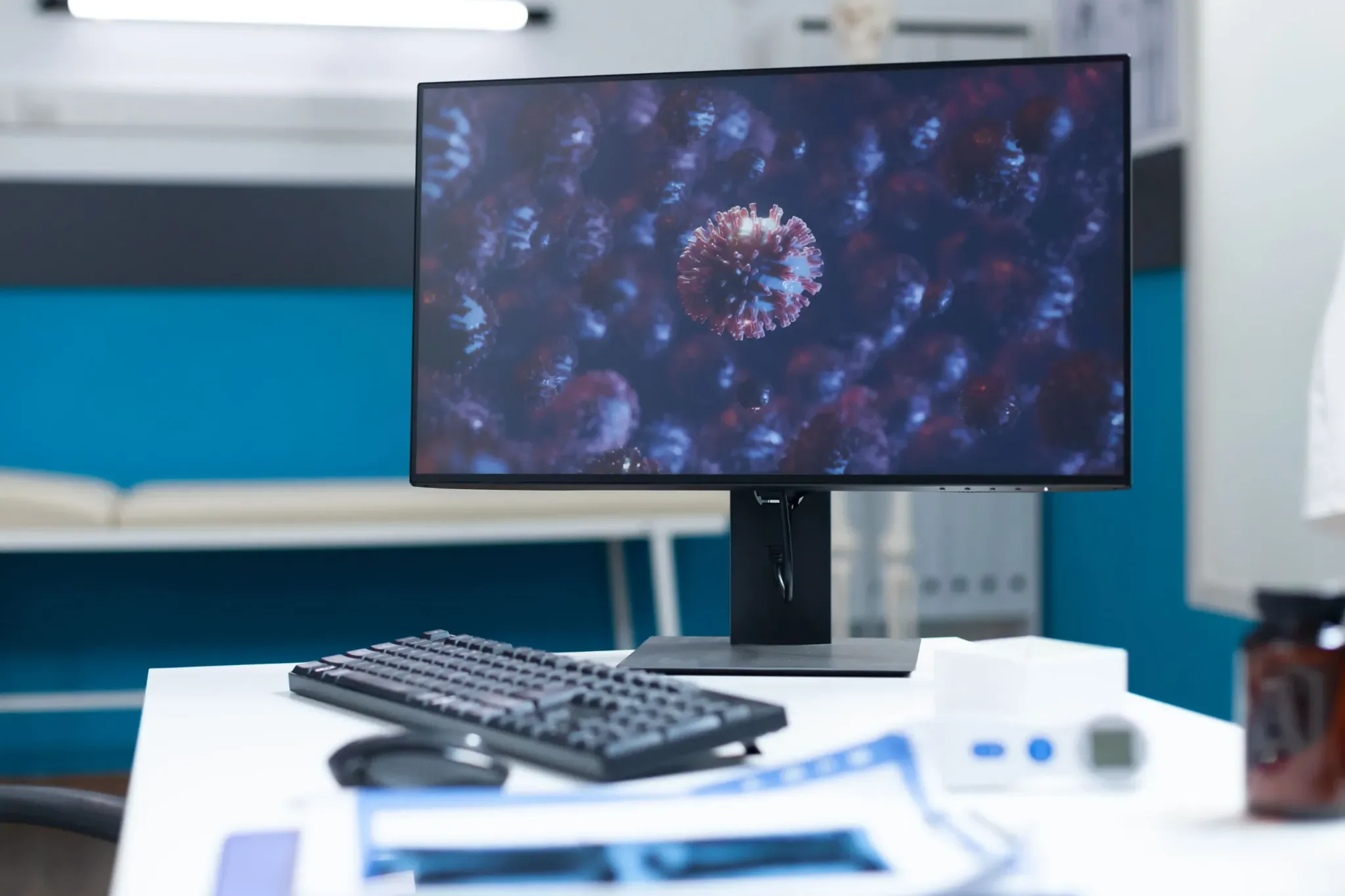Thrombophilia Profile Test
Also known as: Thrombophilia Profile-Maxi
Thrombophilia Profile-Maxi Details in Brief
| Also Known As | Hypercoagulation Panel, Thrombotic Risk Panel, Thrombophilia Screen |
|---|---|
| Purpose | Comprehensive panel for assessing inherited and acquired thrombophilia, aids in identifying risk factors for abnormal blood clotting disorders, supports diagnosis of conditions like deep vein thrombosis (DVT) and pulmonary embolism (PE) |
| Preparation | Clinical history required |
| Fasting | Not required |
| Reporting Time | Next Day: 5:00 PM |
| Cost | 18,500 |
What is a Thrombophilia Profile Test?
A thrombophilia profile test is a comprehensive set of blood tests designed to investigate your body's clotting system. The test helps detect specific inherited or acquired disorders that make you more prone to forming abnormal blood clots, a condition known as thrombophilia.
What does the Thrombophilia Profile Test measure?
The test measures various components of your blood clotting system to identify abnormalities that can increase your risk of thrombosis:
- Protein C and Protein S levels - Natural blood thinners produced by your body to prevent excessive clotting.
- Antithrombin activity - Another crucial natural anticoagulant that controls clot formation.
- Genetic mutations - Specific inherited changes like Factor V Leiden and Prothrombin Gene Mutation that increase clotting risk.
- Anticardiolipin and Anti-beta-2-glycoprotein I antibodies - Antibodies linked to clotting disorders.
- Homocysteine levels - High levels can damage artery walls and increase clot risk.
Thrombophilia Profile Test: Who Needs It and Why It's Done
What Symptoms May Call for a Thrombophilia Profile Test?
Your doctor may recommend this test if you experience symptoms related to blood clots rather than thrombophilia itself:
- Deep Vein Thrombosis symptoms - Swelling, pain, tenderness, redness, or warmth in one leg.
- Pulmonary Embolism signs - Sudden shortness of breath, sharp chest pain, rapid heart rate, or coughing up blood.
- Recurrent pregnancy loss - Multiple miscarriages, especially in the second or third trimester.
- Blood clots in unusual locations - Such as liver, kidney, or brain veins.
Who should get a Thrombophilia Profile Test?
This test is specifically recommended for certain individuals rather than as routine screening:
- People with unexplained blood clots, particularly those occurring before age 50.
- Individuals with strong family history of blood clots in first-degree relatives.
- Women with recurrent unexplained miscarriages or severe pregnancy complications.
- Those who experienced blood clots without clear triggers, like surgery or prolonged immobility.
Why is a Thrombophilia Profile Test done?
The test identifies specific underlying causes of excessive blood clotting, helping doctors determine your long-term health risk and create appropriate management plans to prevent future clots.
Importance of a Thrombophilia Profile Test
The thrombophilia profile test plays a crucial role in shifting medical care from simply treating blood clots to managing underlying chronic risk. It guides treatment decisions by helping doctors determine the type and duration of blood thinner therapy needed.
Results help assess your future risk, allowing for preventive measures during high-risk situations like surgery, pregnancy, or long flights. Since some forms of thrombophilia are genetic, a positive diagnosis can prompt testing for close family members, enabling them to take preventive steps if they also carry the condition.
Thrombophilia Profile Test Booking & Reports – Metropolis Healthcare India
How to Book a Thrombophilia Profile Test?
- Simple Online Booking
Booking can be done through the Metropolis Healthcare App or website. Select the Thrombophilia Profile Test, choose a convenient time slot, and provide your address for a blood test at home. You can also visit the nearest Metropolis Lab if you prefer to give the sample directly at the lab. - Safe Home Sample Collection
Our trained phlebotomists ensure the timely collection of your sample while strictly following all safety and hygiene protocols. - Sample Tracking Updates
Stay informed at every step. From collection to testing, you can track your sample directly through the Metropolis Healthcare website. - Accurate Laboratory Testing
Your sample is processed at our NABL & CAP accredited laboratories, where expert technicians ensure accurate results. - Quick & Easy Reports
Receive your test reports promptly via email, WhatsApp, or by downloading them directly from the Metropolis Healthcare website or app.
Is home sample collection for Thrombophilia Profile Test available near you?
Yes, Metropolis Healthcare provides convenience home blood sample collection for thrombophilia testing. Our trained phlebotomists visit your home at your preferred time, ensuring safe and hygienic sample collection. This convenient service eliminates travel time and waiting queues while maintaining the same accuracy standards as our pathology lab testing.
How Long Does It Take to Get a Thrombophilia Profile Test Report?
Reports are usually available the next day by 5:00 PM once the sample reaches the lab.
Where can I see or get Thrombophilia Profile Test results?
Test results from Metropolis Healthcare can be accessed through multiple convenient channels. You can log in to the Metropolis website using your credentials or use the Metropolis Healthcare App to view and download your reports. Additionally, test reports are sent via email or WhatsApp and you also have the option to collect a physical copy directly from the lab.
Interpreting Thrombophilia Profile Test Results
What Your Thrombophilia Profile Test Results May Indicate
The following table shows the normal reference ranges for each parameter and what abnormal values might suggest:
|
Parameters |
Normal Range |
Low Values May Indicate |
High Values May Indicate |
|
Protein C Activity Functional |
Non Pregnant: 70-130% First Trimester: 78-121% Second Trimester: 83-133% Third Trimester: 67-135% |
Increased thrombosis risk, inherited or acquired deficiency |
Usually not clinically significant |
|
Protein S Activity Functional |
Non Pregnant: 55-123% First Trimester: 57-95% Second Trimester: 42-68% Third Trimester: 16-42% |
3-10 fold increased thrombosis risk, recurrent miscarriage risk |
Usually not clinically significant |
|
Protein S Antigen (Free) |
71-113% For Pregnancy: 1st Trimester: 34 - 133% 2nd Trimester: 29 - 113% 3rd Trimester: 23 - 65% |
Protein S deficiency, thrombotic risk |
Normal protein S levels |
|
Anti Thrombin III Activity Functional |
Non Pregnant: 80-120% First Trimester: 89-114% Second Trimester: 88-112% Third Trimester: 82-116% |
Increased venous and arterial thrombosis risk |
May indicate acute hepatitis, vitamin K deficiency |
|
Antithrombin III Antigen |
80-120% |
Congenital or acquired deficiency |
Normal antithrombin levels |
|
APCR (Activated Protein C Resistance) |
< OR = 120 sec |
Suggests Activated Protein C Resistance |
Usually not applicable |
|
Lupus Anticoagulant |
Absent |
Normal |
Present indicates increased clotting risk |
|
Beta-2-Glycoprotein 1 IgG Antibody |
Negative: < 7.0 U/mL Positive: > 10.0 U/mL Weak Positive: 7.0-10.0 U/mL |
Normal |
Indicates APS risk |
|
Beta - 2 Glycoprotein 1 - IgM antibody |
Negative: < 7.0 U/mL Positive: > 10.0 U/mL Weak Positive: 7.0-10.0 U/mL |
Normal |
Indicates APS risk |
|
Protein C Antigen |
65-140% |
Protein C deficiency, increased risk of thrombosis |
Usually not clinically significant |
|
Cardiolipin IgM antibody |
Negative: < 15.0 MPL U/mL Weak Positive: 15-40 MPL U/mL Positive: > 40.0 MPL U/mL |
Normal |
Indicates APS |
|
Cardiolipin IgG antibody |
Negative: < 15 GPL U/mL Positive: >= 40 GPL U/mL Weak Positive: 15-40 GPL U/mL |
Normal |
Indicates APS |
|
Homocysteine |
5-15 μmol/L |
Usually not clinically significant |
Increased cardiovascular risk, blood clot risk |
Conditions that May Affect Thrombophilia Profile Test Accuracy
Several factors can influence your Thrombophilia Profile Test results and should be discussed with your doctor:
- Blood-thinning medications like warfarin or heparin can significantly interfere with results.
- Acute blood clot episodes can temporarily alter protein levels and should be avoided during testing.
- Pregnancy naturally decreases protein S levels and may affect other parameters.
- Liver disease can reduce production of clotting proteins, affecting results.
- Severe dehydration may concentrate blood components and alter readings.
- Recent illness or stress can temporarily change protein levels.
- Timing of sample collection is crucial as some parameters have specific requirements.
How is a Thrombophilia Profile Test Done?
The test follows a standard blood collection procedure with specific requirements:
- A healthcare professional cleans the area on your arm with an antiseptic wipe.
- A tourniquet is tied around your upper arm to make the veins more visible.
- A sterile needle is inserted into a vein, usually in your forearm.
- Blood is collected into special tubes containing citrate or no additives.
- The needle is removed and a bandage is applied to the puncture site.
- Your sample is labelled and sent to the laboratory for analysis.
How Should You Prepare for a Thrombophilia Profile Test?
Proper preparation ensures accurate results for your thrombophilia testing:
- Medication review - Inform your doctor about all medicines, especially blood thinners, before testing.
- Timing consideration - Avoid testing during active blood clot episodes or acute illness.
- Fasting requirements - No fasting is required, you can eat and drink normally before the test.
- Medical history - Provide complete information about previous clots or family history.
- Anticoagulant therapy - Your doctor may advise temporarily stopping certain medications if medically safe.
Diseases that a Thrombophilia Profile Test Can Help Detect
This comprehensive panel can help identify several important health conditions:
- Deep Vein Thrombosis (DVT) - Blood clots in deep veins, typically in legs.
- Pulmonary Embolism - Blood clots that travel to lungs.
- Antiphospholipid Syndrome - Autoimmune condition causing increased clotting.
- Factor V Leiden mutation - Most common inherited thrombophilia.
- Protein C or S deficiency - Inherited or acquired anticoagulant deficiencies.
- Prothrombin gene mutation - Genetic variation increasing clot risk.
- Recurrent pregnancy loss - Multiple miscarriages due to clotting disorders.
Thrombophilia Profile Test/Packages that You Can Book With Metropolis Healthcare
The following table shows related tests and packages available for comprehensive thrombophilia assessment:
|
Test/Package Name |
Purpose/Highlights |
|
Focused screening for common inherited thrombophilia factors |
|
|
Most comprehensive panel including additional genetic markers |
|
|
Specific antibody testing for antiphospholipid syndrome |
Thrombophilia Profile Test Prices in Different Cities
The cost of a thrombophilia profile test may vary depending on your location. Here's a table showing the approximate prices in different cities:
|
City |
Price |
|
₹17,000 to ₹21,000 |
|
|
₹17,000 to ₹21,000 |
|
|
₹17,000 to ₹21,000 |
|
|
₹17,000 to ₹21,000 |
|
|
₹17,000 to ₹21,000 |
|
|
₹17,000 to ₹21,000 |
Thrombophilia Profile-Maxi Price
Metropolis Healthcare is a leading diagnostics centre and pathology lab in India equipped with the latest state-of-the-art technologies that provides the Thrombophilia Profile-Maxi with a clear pricing structure.
The Thrombophilia Profile-Maxi Price in Mumbai is ₹ 18,500 .
We are committed to deliver accurate and quality results from the best labs in India with complete transparency regarding test cost and turnaround time. No matter where you are, we strive to offer patients high-quality service that is affordable and accessible.
Frequently Asked Questions
The test should ideally not be performed during an acute blood clot or while taking blood-thinning medications. Doctors usually recommend waiting several weeks to months after a clotting event and after safely discontinuing anticoagulants to get accurate results.
Fasting is not required for this test. However, always follow specific instructions given by your doctor for best results.
Yes, severe dehydration can cause blood concentration changes that may potentially affect some coagulation test results. It's advisable to maintain normal hydration levels before any blood test unless instructed otherwise by your doctor.
Follow your doctor's specific instructions regarding medications, especially blood thinners like warfarin or heparin. Inform your doctor about all medicines you're taking. Do not stop prescribed medications without medical guidance.
A trained phlebotomist cleans your arm, applies a tourniquet to make veins visible, and inserts a sterile needle to collect blood into special vials. The entire process takes only a few minutes and has minimal risks.
Risks are minimal and similar to any standard blood draw. You may experience slight pain at the needle site, minor bruising, dizziness, or very rarely, infection. These complications are uncommon and typically resolve quickly without treatment.
Each component has specific reference ranges. Protein C activity should be 70-130%, Protein S activity 55-123%, and homocysteine 5-15 μmol/L. Your doctor interprets the complete report considering your medical history.
The test is also called Hypercoagulation Panel, Thrombotic Risk Panel, or Thrombophilia Screen.
Ratings & Reviews (0)
Why Metropolis?
Metropolis has a team of 200 senior pathologists and over 2000 technicians delivering diagnostic solutions in the areas of routine, semi specialty and super specialty domains like Oncology, Neurology, Gynaecology, Nephrology and many more.
We offer a comprehensive range of 4000+ clinical laboratory tests and profiles, which are used for prediction, early detection, diagnostic screening, confirmation and/or monitoring of the disease.





















 WhatsApp
WhatsApp